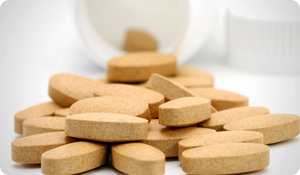
In the last few years, fiber supplements have become all the rage, helping weight-conscious people to feel fuller so they eat less. Fiber is also an efficient stool softener, and sufferers of digestive problems such as irritable bowel syndrome (IBS) and chronic constipation have used it to help manage their symptoms. But keep in mind: It's possible to misuse fiber supplements.
Although there is no evidence to suggest that taking a daily fiber supplement such as Metamucil, Konsyl, or Citrucel is harmful, before taking supplemental fiber, be sure to check with your doctor to make sure it's necessary. Because fiber supplements can decrease the absorption of certain medications, including aspirin, warfarin (a blood thinner), carbamazepine (an anticonvulsant) make sure to ask your doctor if it could interact with any medications you're currently taking. Also, fiber supplements can reduce blood sugar levels, so if you're a diabetic, see to it that you make any necessary adjustments to your insulin dosage.
What's more important is that you get most of your fiber intake from high-fiber foods such as fruits, vegetables, whole grains, beans, and lentils. The American Dietetic Association recommends that adults get between 25 grams and 38 grams of fiber daily. The benefit to getting your fiber from foods is that they provide you with important vitamins, minerals, and antioxidants you won't get from supplements alone.
But if you're not getting enough fiber from the foods you eat and you want to overcome problems with constipation, taking a fiber supplement may help. Here are some tips to keep in mind:
- Introduce additional fiber into your diet slowly to avoid the possibility of gastrointestinal problems, such as excess gas.
- Take your fiber supplement after a meal and be sure to read the label to determine the exact dosage you should take.
- Measure the amount of fiber supplement with a spoon and mix it with eight ounces of water or juice and stir thoroughly.
- If the supplement you're taking is in the form of a pill or wafer, be sure to take it with a full glass of water. And be sure to drink plenty of water or other liquids every day to avoid upset stomach and constipation.
- Because fiber can bind with certain minerals, rendering them ineffective, it's best to take any vitamin or other nutritional supplements several hours after taking the fiber supplement.
Sources:
mayoclinic.com/health/fiber-supplements/AN00130





